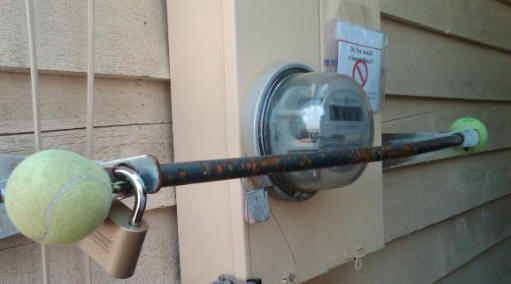This story was sent to me by a reader in response to the story last week about LCUB installing Smart Meters.
Fight Against ‘Wireless Smart Meter
Assault’ Spreads Over Health Concerns

But first, here’s a recap on smart meters and the controversy surrounding their installation. About a year ago, we reported that some people who had smart meters installed in place of analog devices to measure electrical use were experiencing symptoms like headaches, insomnia, tinnitus and DNA breakdown. What’s the alleged association between these devices and negative health impacts? Electromagnetic fields associated with the wireless transmitters. Transmitters such as these, which are similar to those used in cell phones and other wireless electronic devices, have been reported as effecting those who are “electrically hypersensitive” before.
When the Blaze wrote about smart meters in March 2011, a group in California appeared to be leading the charge against the devices that not only seemed to cause health complications but were also invading privacy when it came to monitoring electrical use habits. StopSmartMeters.org was founded in 2010 as an advocacy group but now also provides ”consultation and advice to dozens of local groups sprouting up who are fighting the wireless ‘smart’ meter assault.”
There are now 26 states that have groups or advocates associated with stopping smart meters. One of these is Stop Smart Meters Georgia, which started up this year and has been chronicling activities in the state regarding citizen defense against the devices and proposed legislation. To the group’s relief, legislation that would allow Georgia Power customers to opt out of having the smart meters installed was passed in the state Senate earlier this month. Some cities and states have opt out programs but it can be associated with an additional tax. Georgia’s S.B. 459 opt out would be free of additional charge. Georgia Power opposes the legislation, which is now in the House for review:
With the opt out not yet a done deal, Georgia residents are taking action themselves. CBS Atlanta reports one woman even put a lock on her analog meter to ensure it wasn’t taken by the power company. Watch the report:
According to Georgia Power, since its smart meter program began in 2007, more than 12 million meters have been installed. Installation for remaining customers is expected to be complete later this year. All smart meters installed on homes adhere to maximum permissible exposure limits for radio transmitters set by the Federal Communications Commission. As for Georgia Powers’ meters, it states they “operate at only a fraction of the safe power limits identified by the FCC guidelines.”
Georgia Power, like other electricity providers instituting smart meter programs, states that while it won’t automatically decrease your energy consumption, it will provide you with “detailed energy usage information,” which could adjust your energy habits to consume less.
While there are groups cropping to fight against installation of smart meters, there are also those, including power companies, trying to call attention to scientific research that states radio-frequency levels associated with the devices is safe. Last year, the California Council on Science and Technology released a report that found “when installed and properly maintained, [the devices] result in much smaller levels of radio frequency (RF) exposure than many existing common household electronic devices, particularly cell phones and microwave ovens.”
The World Health Organization has also said, “there is no convincing scientific evidence that the weak RF (radio frequency) signals from base stations and wireless networks cause adverse health effects.”
But the jury on the meters even among scientific groups appears to be out. The American Academy of Environmental Medicine issued a letter to the California Public Utilities Commission earlier this year stating that its own review of existing medical literature found the devices are not safe. It wrote, “Chronic exposure to wireless radiofrequency radiation is a preventable environmental hazard that is sufficiently well documented to warrant immediate preventative public health action.”